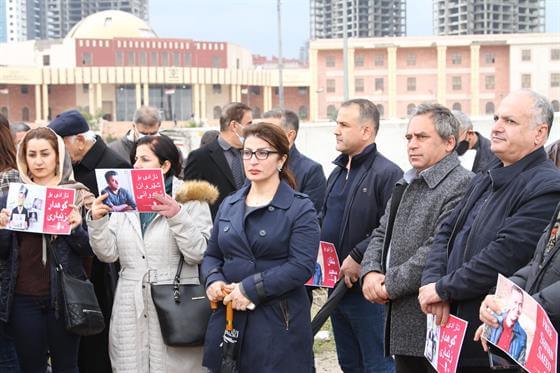
ERBIL, KURDISH REGION OF IRAQ - (Photo by Yunus Keles/Anadolu Agency via Getty Images)
International media development organisations express their grave concern that press freedom is increasingly under threat in the Kurdish Region of Iraq
The Court ruling of the 16 February 2021 sentencing journalists and civil society activists to six years in prison for undermining national security, has led to grave concerns regarding the room for open public debate in the Kurdish Region of Iraq.
As international media development organisations working to support good journalism in the Kurdish Region of Iraq, we are concerned by the precedent this judgment sets. Independent journalism contributes to constructive public debate.
Local journalists also expressed their fear that this court ruling will have an impact on the work of journalists in the future: “The aim behind the ruling is not only to punish these five persons, but rather to send a message to all journalists and activists that they will from now on be referred to the courts for writing a comment, a post on Facebook or expressing an opinion,” says freelance journalist Maaz Farhan.
Respect for the rule of law and for the right of people to freedom of expression are crucial elements of vibrant, functioning states. Open public debate in which critical views can be exchanged without fear of persecution are signs of strong and healthy governments. Overreach of legal powers will instead lead to decreasing appetite among people to engage in public debate, which is important for the unity, peace and stability. According to writer and journalist Asos Hardi, “Kurdistan stands today before a fateful moment, and it needs the support of the world’s free people more than ever.”
We strongly hope that the Kurdish authorities will choose to support the important role of journalists in contributing to the Kurdish society in the Region of Iraq at this pivotal moment.
IMS
Free Press Unlimited
MiCT

——
Maaz Farhan, Freelance Journalist based in Kurdistan Region of Iraq:
“Freedom of expression in Kurdistan is under constant threat, despite the existence of legal texts that protect the right of expression, but the rulers ignore these texts by threatening journalists and activists, assaulting them, arresting them and sometimes killing them. Although most of the aggressors are known among the public opinion, the ruling parties turn a blind eye to them.
“What happened on February 16 in the Erbil courts against journalists and civil society activists indicates that the ruling parties have reached indifference and recklessness regarding press freedom, as they weave accusations against journalists and activists and punished them through the courts. Not to mention that these parties do not even hesitate to claim their responsibility towards that.
“If the ruling parties previously punished the free people through their own security services, but today, because of control over all aspects of society, the judicial system has become subordinate and subject to the same control. Consequently, they practice oppression unashamedly in broad daylight and make it part of daily politics throughout the judicial system, as we see it in the behaviour of authoritarian and totalitarian regimes that the region has suffered from for decades. And the big fear is that they succeed in that.
“Kurdistan today stands before a fateful moment, and it needs the support of the world’s free people more than ever. Today we are facing with two options: converting this great injustice into an opportunity to put an end to the authoritarian family domination, or bidding farewell to freedom of expression for a long time in the Kurdistan region.”
Asos Hardi, Writer and Journalist based in Kurdistan Region of Iraq.




